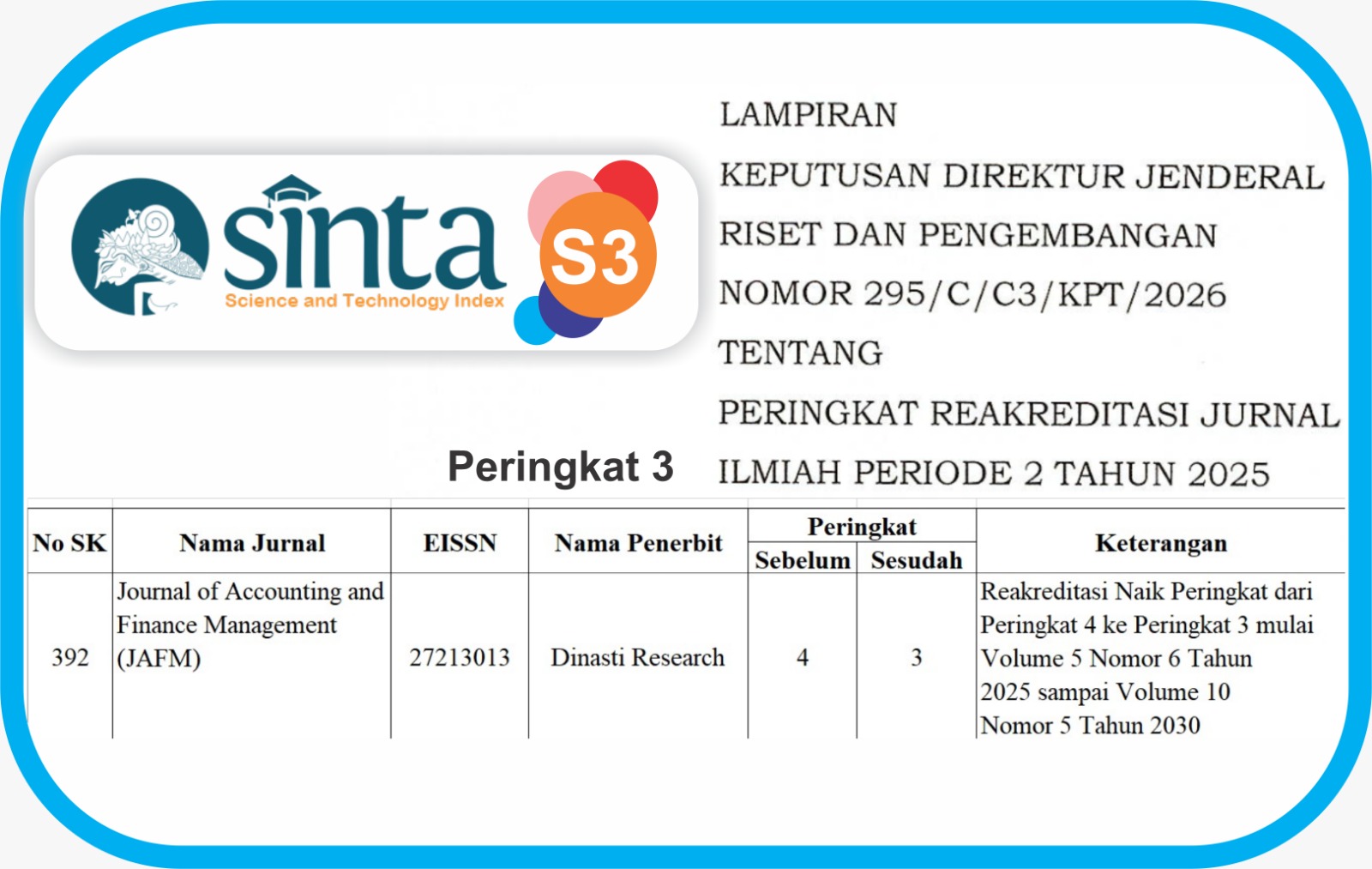Pengaruh Kecerdasan Emosional, Perilaku Belajar, Motivasi, Budaya, Kesiapan, dan Kesadaran Terhadap Tingkat Pemahaman Akuntansi Pada Mahasiswa Akuntansi Kota Surakarta
DOI:
https://doi.org/10.38035/jafm.v5i3.584Keywords:
Accounting Comprehension, Emotional Intelligence, Learning Behavior, Motivation, Culture, Self-Readiness, Self-AwarenessAbstract
This study aims to examine the relationship between emotional intelligence, learning behavior, motivation, culture, readiness, and awareness with the level of accounting comprehension among students in Surakarta. Purposive sampling was utilized in this study to sample accounting students who responded to a survey from three Suarakarta area universities. Respondent's completed questionnaires were used to gather primary data. Multiple linear regression analysis is the analytical technique used to quantify the effect of independent variables in accounting knowledge. The findings indicate that emotional intelligence, learning behavior, motivation, culture, readiness, and awareness significantly contribute positively to students' understanding of accounting. Regression analysis also suggests that higher values of these variables correspond to higher levels of accounting comprehension achieved.
References
A. Suwardjono.(2004). The Factor Analysis Determining The Public Companies Compliance to The Information Regulation in Indonesia. Socioscience, 17(3), 443-457.
Adriana, Ayu. 2021. “Pengaruh Kecerdasan Emosional Dan Perilaku Belajar Terhadap Tingkat Pemahaman Akuntansi Pada Program Studi Akuntansi Universitas Medan Area.” Skripsi: 86. https://repositori.uma.ac.id/.
Budhiyanto Nugroho, Dan Ika Paskah. 2004. "Pengaruh Kecerdasan Emosional terhadap Tingkat Pemahaman Akuntansi". Jurnal Ekonomi Bisnis, Vol. X, No.2.
da Costa, M. G., Pinto, L. H., Martins, H., & Vieira, D. A. (2021). Developing psychological capital and emotional intelligence in higher education: A field experiment with economics and management students. The International Journal of Management Education, 19(3), 100516.
Darmasari, Luh Budi, and Made Arie Wahyuni. 2020. “Pengaruh Sosialisasi SAK EMKM, Pemahaman Akuntansi, Dan Tingkat Kesiapan Pelaku UMKM Terhadap Implementasi SAK EMKM Dalam Penyusunan Laporan Keuangan Pada UMKM Di Kabupaten Buleleng.” JIMAT (Jurnal Mahasiswa Akuntansi) Universitas Pendidikan Ganesha e-ISSN: 2614-1930 11(2): 136–46. https://doi.org/10.23887/jimat.v11i2.25932.
Fithriyah, Masnabilah et al. 2021. “Pengaruh Kesiapan Dan Kepuasan Mahasiswa Selama Pembelajaran Daring Terhadap Performa Akademik Mahasiswa Pre-Klinik Fakultas Kedokteran Universitas Islam Malang.” Jurnal Kedokteran Komunitas: 1–12.
Gittings, L., Taplin, R., & Kerr, R. (2020). Experiential learning activities in university accounting education: A systematic literature review. Journal of accounting education, 52, 100680.
Goleman, D. (2000). Kecerdasan emosional. Gramedia Pustaka Utama.
Jeacle, I., & Miller, P. (2016). Accounting, culture, and the state. Critical perspectives on accounting, 37, 1-4.
Marita, S. S., & Shaalih, H. S. (2008). Kajian empiris atas perilaku belajar dan kecerdasaan emosional dalam mempengaruhi stres kuliah. Prosiding Simposium Nasional Akuntansi VII.
Meindy, Nadhira, Achmad Djunaidi, and Airin Triwahyuni. 2022. “Adaptasi Five Facet Mindfulness Questionnaire Bahasa Indonesia.” Psychocentrum Review 4(1): 1–19.
Pintrich, P. R., and Elisabeth V De Groot. 1990. “Motivational and Self-Regulated Learning Components of Classroom.” Journal of Educational Psychology 82(1): 33–40.
Samsuddin, M. E., Khairani, N. S., Wahid, E. A., & Abd Sata, F. H. (2015). Awareness, motivations and readiness for professional accounting education: A case of accounting students in UiTM Johor. Procedia Economics and Finance, 31, 124-133.
Tikollah, M. R., Triyuwono, I., & Ludigdo, U. (2006). Pengaruh kecerdasan intelektual, kecerdasan emosional, dan kecerdasan spiritual terhadap sikap etis mahasiswa akuntansi (Studi pada Perguruan Tinggi Negeri di Kota Makassar Provinsi Sulawesi Selatan). Simposium Nasional Akuntansi, 9, 23-26.
Yoo, Boonghee, Naveen Donthu, and Tomasz Lenartowicz. 2011. “Measuring Hofstede’s Five Dimensions of Cultural Values at the Individual Level: Development and Validation of CVSCALE.” Journal of International Consumer Marketing 23(3–4): 193–210.
Downloads
Published
How to Cite
Issue
Section
License
Copyright (c) 2024 Natasha Sekarayu Anlistya Nugraha, Zulfikar Zulfikar

This work is licensed under a Creative Commons Attribution 4.0 International License.
Authors who publish their manuscripts in this journal agree to the following conditions:
- The copyright on each article belongs to the author(s).
- The author acknowledges that the Journal of Accounting and Finance Management (JAFM) has the right to be the first to publish with a Creative Commons Attribution 4.0 International license (Attribution 4.0 International (CC BY 4.0).
- Authors can submit articles separately, arrange for the non-exclusive distribution of manuscripts that have been published in this journal into other versions (e.g., sent to the author's institutional repository, publication into books, etc.), by acknowledging that the manuscript has been published for the first time in the Journal of Accounting and Finance Management (JAFM).



























